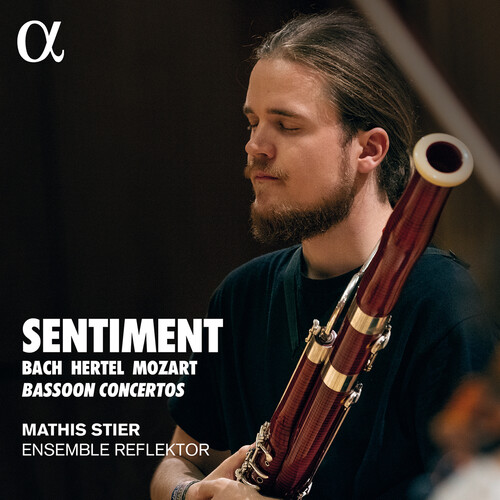Show results for
Deals
- 4K Ultra HD Sale
- 50s Films Sale
- Action Sale
- Alternative Rock Sale
- Anime sale
- Award Winners Sale
- Bear Family Sale
- Blu ray Sale
- Blues on Sale
- British Sale
- Christmas in July
- Classical Music Sale
- Comedy Music Sale
- Comedy Sale
- Country Sale
- Criterion Sale
- Electronic Music sale
- Folk Music Sale
- Horror Sci fi Sale
- Kids and Family Sale
- Metal Sale
- Music Video Sale
- Musicals on Sale
- Mystery Sale
- Naxos Label Sale
- Page to Screen Sale
- Paramount Sale
- Rap and Hip Hop Sale
- Reggae Sale
- Rock
- Rock and Pop Sale
- Rock Legends
- Soul Music Sale
- TV Sale
- Vinyl on Sale
- War Films and Westerns on Sale

Sentiment
- Format: CD
- Release Date: 3/25/2022

Sentiment
- Format: CD
- Release Date: 3/25/2022
- Composers: Johann Sebastian Bach, Johann Wilhelm Hertel
- Label: Alpha
- UPC: 3760014198250
- Item #: 2472365X
- Genre: Classical
- Release Date: 3/25/2022

Product Notes
Born in 1994, bassoonist Mathis Stier not only won second prize at the 2019 ARD Competition, but was also awarded the coveted Audience Prize. Mathis Stier has a natural affinity with the music of the 18th century and the three works which he has chosen for his ALPHA debut demonstrate it's principal characteristics: Baroque, Empfindsamkeit / Sturm und Drang and Viennese Classicism. The composers J.S. Bach, Johann Wilhelm Hertel and W.A. Mozart represent three generations: father, son and grandson. The conventions of each previous generation are questioned, musical boundaries are broken down and new paths are taken, until the generational revolt finds it's way back to more conventional channels. This is how Mathis Stier describes the phenomenon: "Musically, the Mozart Concerto represents the classical bassoon and is probably the best-known work in the original literature. Hertel's concerto, on the other hand, is unusual and fairly unknown even among bassoonists. It deserves to be more widely known, however, because it is an exceedingly remarkable and idiosyncratic piece. Finally, the Bach Concerto, while a very well-known work, is extremely rarely performed in this version and thus represents an addition to the repertoire. The adaptation for the bassoon is obvious, since the (reconstructed) original was probably composed for the similar-sounding oboe d'amore. Moreover, setting pieces in a different key was common practice for Bach."

